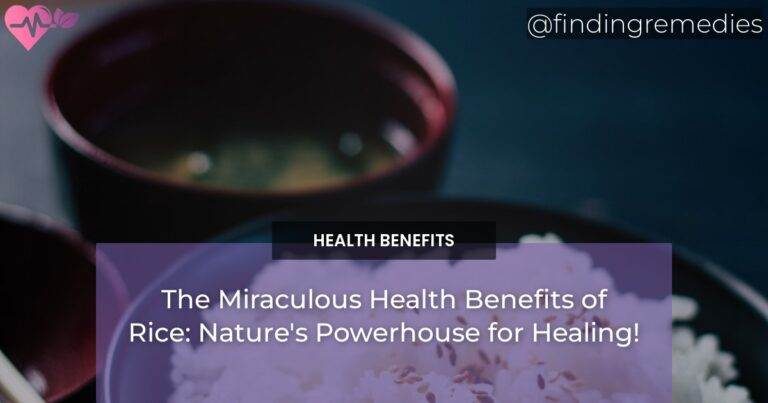Rice is a staple food in many cultures and provides numerous health benefits. This comprehensive guide will cover health benefits of rice, it’s nutrition profile, natural compounds, and potential risks. We will also provide information on different rice varieties and proper storage methods.
Table of Contents
Introduction
Rice has been a staple food in many cultures for centuries. It is an excellent source of carbohydrates and provides energy to the body. Rice is also a versatile food that can be incorporated into many different dishes. In this guide, we will explore the health benefits of rice and how it can be included in a healthy diet.
Nutrition Profile of Rice
Rice is a nutritionally dense food that provides both macro and micronutrients. A cup of cooked rice contains:
- Calories: 205
- Carbohydrates: 45 grams
- Protein: 4 grams
- Fat: 0.4 grams
- Fiber: 0.6 grams
- Vitamin B1: 12% of the RDI
- Vitamin B3: 15% of the RDI
- Vitamin B6: 8% of the RDI
- Folate: 6% of the RDI
- Manganese: 19% of the RDI
- Magnesium: 11% of the RDI
- Phosphorus: 8% of the RDI
- Selenium: 27% of the RDI
Rice is also a good source of other micronutrients such as iron, zinc, and copper. The nutritional profile of rice varies depending on the type of rice.
Health Benefits of Rice
Provides Energy and Boosts Stamina
Rice is a great source of carbohydrates, which provides energy to the body. Consuming rice can help improve stamina and reduce fatigue.
Helps in Weight Management
Rice is a low-fat and low-sodium food that is rich in fiber. Including rice in a balanced diet can aid in weight management by providing satiety and reducing overall calorie intake.
Contains Anti-inflammatory Properties
Rice contains natural anti-inflammatory compounds that can reduce inflammation in the body. This can be beneficial for people with inflammatory conditions such as arthritis.
Supports Cardiovascular Health
Rice is a whole grain that contains high levels of fiber, plant-based protein, and other heart-healthy compounds. Consuming rice as part of a balanced diet can help reduce the risk of cardiovascular disease.
Helps in Digestion and Prevents Constipation
Rice is a digestion-friendly food that can help prevent constipation. The high fiber content in rice can promote regular bowel movements and improve gut health.
Provides Antioxidant Benefits
Rice is rich in antioxidants such as phenolic acids, tocopherols, carotenoids, and other natural compounds. These antioxidants can help combat free radicals and prevent cellular damage in the body.
Helps in Regulating Blood Sugar
Rice has a low glycemic index, which means it doesn’t cause a rapid increase in blood sugar levels. Including rice in a balanced diet can help regulate blood sugar levels and reduce the risk of diabetes.
ALSO READ
Natural Compounds in Rice
Rice contains several natural compounds that provide health benefits:
- Antioxidants
- Phenolic Acids
- Phytic Acid
- Tocopherols
- Carotenoids
These compounds have been shown to have anti-inflammatory, antioxidant, and anti-cancer properties.
Effects of Cooking on Rice
Proper cooking methods can help retain the nutrient content in rice. The best cooking methods for rice are boiling, steaming, and microwave cooking. Overcooking rice can result in nutrient loss and reduce its health benefits.
ALSO READ
Proper Storage of Rice
Rice should be stored in an airtight container in a cool, dry place. Proper storage can help maintain the quality, texture, and flavor of rice. Uncooked rice can last up to two years, while cooked rice should be consumed within a few days.
Risk Factors Associated with Rice Consumption
Consuming rice may have some potential risks:
- Arsenic Contamination in Rice
- Pesticide Residues in Rice
- Gluten Intolerance
- High Glycemic Index
These risks can be mitigated by choosing organic, gluten-free, and low glycemic index rice varieties.
Rice as a Medicine
Rice has been used as a medicinal food for centuries. It can be used to heal several diseases and health conditions. A rice-based diet can be beneficial for people with:
- Cardiovascular Disease
- Diabetes
- High Blood Pressure
- Obesity
- Cancer
Types of Rice
There are several types of rice available:
- White Rice
- Brown Rice
- Wild Rice
- Red Rice
Each type of rice has a different nutritional profile and health benefits.
Advantages and Disadvantages of Rice Consumption
Advantages of Rice Consumption
- Affordable and widely available
- Low-fat and low-sodium food
- Rich in fiber and plant-based protein
- Gluten-free and easy to digest
- Provides energy and boosts stamina
Disadvantages of Rice Consumption
- Potential risks associated with contamination and pesticide residues
- High glycemic index in some varieties
- Possible gluten intolerance in some individuals
- May not provide enough essential nutrients on its own
Conclusion
Rice is a versatile and nutritious food that can be included in a healthy diet. It provides numerous health benefits such as energy, heart health, and digestion-friendly properties. By understanding the risks and benefits associated with rice consumption, individuals can make informed decisions about including rice in their diet.

